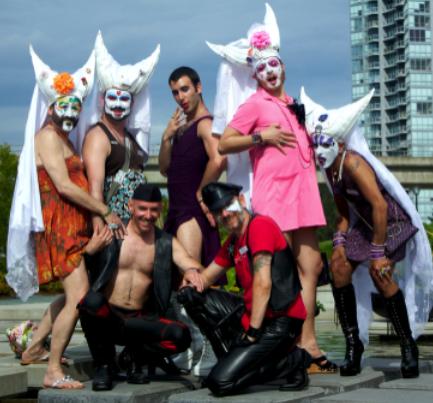The pioneering Sisters of Perpetual Indulgence are back, and just in time for Halloween.
A new documentary, Bad Habits: The Return of the Sisters of Perpetual Indulgence, chronicles the rise, fall and rise of the queer charitable group that was launched on an Easter weekend in 1979. That was when Sister Missionary Position and some friends decided to tweak the San Francisco “Castro clone” jeans-and-flannel look by donning nuns’ habits.
Greeted with varying degrees of delight, outrage, laughter and reverence, they began using their provocative outfits for activism, vowing to “promulgate universal joy and expiate stigmatic guilt while serving our community.”
“I thought it was just a bunch of gay men making fun of nuns,” says Toronto broadcast journalist and Bad Habits director Kevin O’Keefe, who remembers being “shocked” to discover these Sisters take their vows of charity every bit as seriously. During the AIDS crisis in the 1980s, O’Keefe says, “they held the first AIDS vigil anywhere in the world; they were among the first to speak out about living with HIV and to develop plain-language safe-sex education.”
Sister Merry Q Contrary, from Vancouver’s Abbey of the Long Cedar Canoe Society, admits that when the Sisterhood began, “part of their intent was to criticize the religious structures that excluded and persecuted gay and lesbians.” Today’s nuns, however, “present a hopeful and optimistic view of how the world could be.”
Toronto NDP MPP Cheri DiNovo, author of Qu(e)erying Evangelism, is interviewed in the film, referring to the Sisters as “exactly what the Catholic Church needs.”
That may be, says Sister Ethica Slüt, currently studying medicine in Hamilton, “but I always remind people there are nuns from many different faiths and we are but one of those.”
O’Keefe points out that Sister Hyde N Sikh, a member of the Vancouver order, wears a bejewelled turban instead of a wimple. Whether Catholic or Buddhist, each nun’s practice is unique, says Sister Slüt, who devotes her time to “loving the freaks in our world.
“We make being weird or freakish okay. Even Vancouver, as cool as it is, is still a very conservative city for queer people to live in.”
Toronto’s chapter fizzled in 1986 after some early groundbreaking HIV/AIDS activism. Mayor Art Eggleton and city council opposed the nuns’ Catholic parody.
“I think the Toronto chapter was a few years ahead of their time,” says Sister Contrary. “They mirrored parts of the community that the community wasn’t yet able to look at.”
Sister Slüt hopes that’s changed.
The Toronto premiere of O’Keefe’s film is at a fundraiser for the Toronto People with AIDS Foundation. It is dedicated to the memory of Nitto Marquez, a caseworker at PWA and co-founder of Gay Asians Toronto and the TO chapter of the Sisterhood. “Everyone at the PWA office was delighted to do this in Nitto’s memory,” O’Keefe says. “HIV/AIDS is one of their biggest mandates . . . this was a perfect fit.”
O’Keefe says he felt compelled to make the film. “For all the privileges I have, I owe a debt of gratitude to these people and, whether we like to admit it or not, they’re still needed.”
The Deets:
Bad Habits screens on Sat, Oct 15 at 6pm at Toronto’s Royal Theatre, 608 College St.
Bad Habits‘ world television premiere is on Sun, Oct 16 at 9pm ET on ichannel.


 Why you can trust Xtra
Why you can trust Xtra


